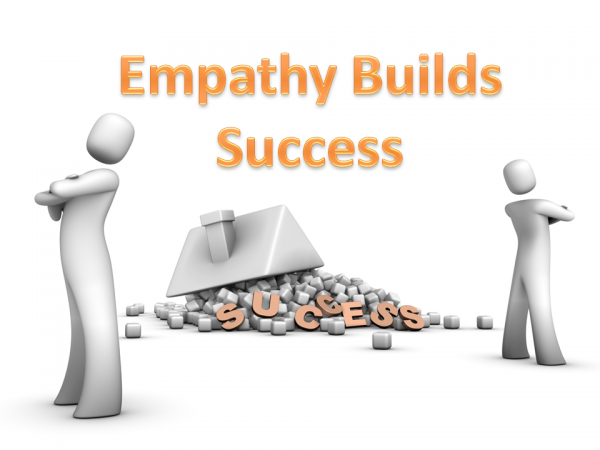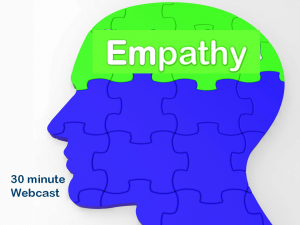 The “E” in TIGERS®, empathy is one of the six common sense and researched-based principles required for high functioning group behavior. Deploying emotional intelligence is the first step to leading with empathy. When groups of employees cooperate well, business are more successful then businesses with a dog-eat-dog work culture. Empathy is important because it is the principle that anchors emotional intelligence in the workplace, which means that leaders cannot achieve high emotional intelligence without first embracing empathy.
The “E” in TIGERS®, empathy is one of the six common sense and researched-based principles required for high functioning group behavior. Deploying emotional intelligence is the first step to leading with empathy. When groups of employees cooperate well, business are more successful then businesses with a dog-eat-dog work culture. Empathy is important because it is the principle that anchors emotional intelligence in the workplace, which means that leaders cannot achieve high emotional intelligence without first embracing empathy.
Empathetic leaders understand how customer, employee and social media empathy affect one another, and they understand the importance of implementing and measuring company programs dedicated to empathetic leadership. Companies and leaders who do not place enough value on empathetic leadership will find that customer satisfaction, profits and employee engagement suffer in the long term, even if the company experiences short-term gains.
By placing importance on empathetic leadership and increasing their emotional intelligence, leaders will be better equipped to lead their organizations to succes.
Five ways to build empathy in the workplace
The following is a list of strategies that build empathy in the workplace:
Focus on the three areas of customer, employee and social media empathy.
In order to promote empathy, leaders need to focus on all three areas of work relationships. These include customer, employee and social media relationships. Although it seems common sense, employees represent internal organizational relationships where empathetic behavior and leadership is critical. Empathy is the ability to imagine what another person feels and their circumstance whether you agree or not. One of the best ways to begin deploying empathy in the work place is to imagine how you would feel if a situation were flipped. As a leader, your employees are your most important asset, and without them, you likely would be out of business or without a job.
Customers and social media represent the external business environment where empathy practice is also critical to the continuation of your business. Customers who do not have a good experience with your business or product will not come back or refer their friends, which affects the long-term success of your business. The social media aspect is a relatively new and important aspect of empathy. Many people look to social media to learn about companies, so leaders need to focus on building a brand that depicts empathy. For example, the owner of a business posted a message quoting a current politician running for President. The post advocated for punching people in the face that you disagree with with the comment – Right On! Advocating for physical violence and assault and battery probably wasn’t a good idea.
Promote and hire women.
According to new Korn Ferry and Hay Group study entitled, New Research Shows Women Are Better at Using Soft Skills Crucial for Effective Leadership and Superior Business Performance, women typically have higher levels of emotional intelligence than men. The study states that women outperform men in 11 of the 12 most important emotional intelligence competencies. According to the research, women ranked higher than men in emotional self-awareness, positive outlook, inspirational leadership and adaptability, among others. Women and men were ranked equally in emotional self-control. To revamp your commitment to empathy in your organization, consider hiring more women in top roles.
Create a culture of collaborative thinking.
Many organizations focus on a culture of winners and losers, which will only lead to winners and losers, says Empathetic Rules of Disagreement – Let’s Build An Accountable Outcome. Work cultures with collaborative thinking and cooperation among employees, however, focus on creating solutions that work for all parties involved. This type of culture requires that all parties utilize empathy when working with one another. When all parties are empathetic with one another, they take the time to listen to and understand each others point of view, and they work together to create a favorable solution for all parties. This leads to higher employee productivity and satisfaction, as employees feel that their opinions matter.
Focus on your needs, as well as the needs of others.
Emotionally intelligent and empathetic leaders focus on the needs of everyone involved with the business, including themselves, notes How Effective Are Emotionally Intelligent Leaders – Really? Before being empathetic with others, leaders need to assess their own thoughts, feelings and actions. When leaders take the time to do this, they are better able to identify their own strengths and weaknesses, giving them the opportunity to divert their focus or learn new skills to better serve their team members and customers. After this occurs, leaders can then take the time to assess others and respond through empathy.
Remain mindful.
Mindfulness is the ability to keep yourself in the moment and focus on the task at-hand. By remaining mindful, leaders are better able to perform their management and relationship tasks, which helps their team members to feel important and heard. To increase their self-awareness, leaders can meditate, ask for constructive feedback from team members and self-evaluate. Leaders should also hold themselves accountable for their own mistakes, which will encourage team members to do the same.
Emotional intelligence and empathy are important for an organization’s success, as empathetic and emotionally intelligent leaders experience higher productivity and engagement levels from their team members. To improve their emotional intelligence, leaders can focus on customers, employees and social media; promote and hire women to leadership roles; create a culture of collaborative thinking; focus on their own needs, as well as the needs of others; and remain mindful in their positions.
Here are some additional articles you might find valuable to this post.
- Corporate Empathy Is Not an Oxymoron
- New Research Shows Women Are Better at Using Soft Skills Crucial for Effective Leadership and Superior Business Performance, Finds Korn Ferry Hay Group
- Empathetic Rules of Disagreement – Let’s Build An Accountable Outcome
- How Effective Are Emotionally Intelligent Leaders – Really?
- 12 Self-Awareness Exercises That Fuel Success
Copyright TIGERS Success Series, Inc. by Dianne Crampton
About TIGERS(R) Success Series, Inc.
TIGERS Success Series is a Bend, Oregon Leadership and Team Improvement Consultant that helps committed leaders build more cooperation among employees and collaboration between departments for improved revenue, purpose and scalable impact.
We do this by deploying the TIGERS team process that improves workforce behaviors that are anchored by trust, interdependence, genuineness, empathy, risk resolution and success. Providing diagnostics and customized team interventions, you can improve both work culture and transform your adequate teams into exceptional ones. We also license and train HRD Executives, Project Managers, Managers, Trainers and Team Consultants in the use of our award winning resources. For more information, call 1+ 541-385-7465.
